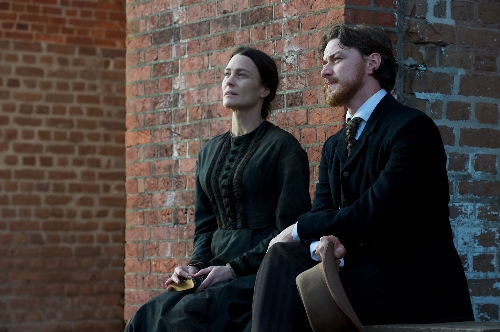‘The Conspirator’ a compelling account of days following Lincoln assassination
July 4, 1776. Dec. 7, 1941. Sept. 11, 2001.
Chances are, most Americans recall what happened on those momentous days, from the American colonies' declaration of independence from Great Britain to the Japanese attack on Pearl Harbor that brought the U.S. into World War II -- and the terrorist attacks that destroyed New York's World Trade Center and damaged the Pentagon in Washington, D.C.
More than a century ago, Americans noted another fateful date: April 15, 1865, the day Abraham Lincoln died, forever altering the nation's recovery from a shattering Civil War.
And now, 146 years to the day after Lincoln's death, comes "The Conspirator," a compelling historical account of those dark days following the president's assassination.
Compelling, that is, for those of us who relish the chance to climb aboard a cinematic time machine and travel back to a pivotal time in the nation's history.
If your idea of a good time at the movies involves high-tech special effects and lots of stuff blowing up real good, "The Conspirator" will provide little diversion.
If, however, your tastes run to a complex and challenging story well told, then by all means step back in time -- and ponder the movie's thought-provoking examination of what happens when a nation's outrage overpowers its dedication to its principles.
That's the painful lesson learned by Frederick Aiken (James McAvoy), a Union officer who survives his battlefield wounds to return to Washington, D.C., in hopes of pursuing a legal career now that the war is all but over.
He'll get his chance to prove his mettle in trial -- but not as he expects.
For now, all Washington seems preoccupied with celebrating the Union's impending victory over the upstart Confederate States of America.
Even President Lincoln takes his leisure the night of April 14, accompanying Mrs. Lincoln to Ford's Theatre to see the British comedy "Our American Cousin" unfold onstage.
Until the fateful moment when actor John Wilkes Booth (Toby Kebbell ), a Southern loyalist unable to accept defeat, enters the presidential box, aims his Derringer pistol at Lincoln's head, and fires, becoming the first presidential assassin in U.S. history.
But Booth was only part of the conspiracy; another plotter struck Secretary of State William Seward, while others failed in their assignments to murder government officials, including Vice President Andrew Johnson.
Taking charge while keeping a bedside vigil beside his dying president, Secretary of War Edwin Stanton (a commanding Kevin Kline) orders the conspirators rounded up immediately.
One of them is widow Mary Surratt (Robin Wright), a Confederate sympathizer who runs a Washington boarding house. Her son John is reportedly part of Booth's circle, but he's nowhere to be found. She's arrested and imprisoned instead. Besides, the dastardly assassination plot may have been hatched under her roof; how could she not have known?
Mary insists she's innocent, but no one's inclined to pay any attention. Not even Maryland Sen. Reverdy Johnson (starchy Tom Wilkinson), who's been asked to defend her, has any stomach for the proceedings.
Instead, he taps Aiken to assist -- and, ultimately, replace -- him as Mary Surratt's defense counsel, setting the stage for a legal education of eye-opening proportions.
Especially when Stanton and prosecutor Joseph Holt (a grandiloquent Danny Huston), determined to deal with the conspirators in coldly efficient fashion, substitute a military tribunal for a civilian trial.
As for Aiken, despite his outrage over Lincoln's assassination, he's not wholly convinced of Mary Surratt's guilt. His client won't tell him anything, but her daughter (a wily yet anguished Evan Rachel Wood) might. Aiken also uncovers evidence that might exonerate her. Assuming he's allowed to present such evidence in a legal proceeding that shows every sign of being a rubber-stamp for the nation's vengeance against Lincoln's murderers.
Thus "The Conspirator" explores not one but two conspiracies -- the plot to assassinate Lincoln, and the government plan to railroad Mary Surratt, regardless of her legal rights.
Director Robert Redford has been down this particular trail before, negotiating moral minefields in movies as different as 1994's incisive "Quiz Show" and 2007's haranguing "Lions for Lambs."
This time, however, Redford and screenwriter James D. Solomon (TV's "The Bronx Is Burning") wisely restrain any message-mongering impulses, allowing those of us in the audience to make up our own minds about the movie's central philosophical question: What does it mean to be a patriot? Is it defending, even avenging America -- or is it defending the principles America stands for, regardless of popular sentiment or wartime expediency?
The movie addresses those questions, to be sure, but the moral musings occur within the story, not alongside it. Instead, "The Conspirator" concentrates on uncovering its two conspiracies: the assassination plot itself, and the government's plan to punish them, eliminate them -- and remove them from the public consciousness.
In telling this complex tale, Redford takes his time but doesn't dawdle, maintaining a stately, deliberate pace as the plot threads, and conflicts, intertwine. Visually, the faded-glory color palette and slowly prowling camera reinforce the period setting. And as always, Redford remains a master of mood, conveying the edgy desperation of a nation anxious to leave bloody conflicts behind and get on with the process of recovery -- and Reconstruction.
Also as always, Redford allows his gifted cast members plenty of room to inhabit their characters, from Kline's zealous avenger to Huston's all-too-practical prosecutor, who may realize what's happening but goes along because it's his job to get the job done.
In McAvoy's able portrayal, Aiken goes from eager idealist to reluctant advocate to disillusioned cynic, one who's shocked and disillusioned to find the principles he fought for in the war no longer seem to apply. He also transforms himself into a surrogate son for his client, who's been deserted by her own son -- a son who might be able to clear her name.
As for "The Conspirator's" title character, the slender Wright doesn't physically resemble Mary Surratt (who was described as "buxom" in newspaper accounts of her trial). Yet Wright conveys Surratt's dignity, determination and stubbornness with understated grace, capturing the predicament of a stoic resigned to her fate -- whether she deserves it or not.
Contact movie critic Carol Cling at ccling@reviewjournal.com or 702-383-0272.
Review
"The Conspirator"
123 minutes
PG-13; violent content
Grade: B
at multiple locations
Deja View
From drama to comedy, the Civil War has inspired a wide range of cinematic interpretations, including these memorable titles:
"The General" (1926) -- This silent comedy classic, based on a real-life Civil War incident, follows a Southern engineer (Buster Keaton, who also directed) determined to recapture the title locomotive, and his beloved, from Union spies.
"Gone With the Wind" (1939) -- In this Oscar-winning blockbuster, the Civil War provides an epic backdrop for the tempestuous romance of Southern belle Scarlett O'Hara (Oscar-winner Vivien Leigh).
"Glory" (1989) -- Leading the Union's first all-black volunteer company, Robert Gould Shaw (Matthew Broderick) fights not only Confederates but prejudice among fellow officers in Edward Zwick's stirring drama featuring Carey Elwes, Morgan Freeman and Oscar-winner Denzel Washington.
"Gettysburg" (1993) -- The Civil War's most decisive battle inspires this more than four-hour adaptation of Michael Shaara's "The Killer Angels," featuring Jeff Daniels, Tom Berenger, Stephen Lang, Sam Elliott, Richard Jordan and Martin Sheen, along with thousands of battle re-enactors.
"Ride With the Devil" (1999) -- After Union soldiers kill his father, a Missourian (Skeet Ulrich) and his friend (Tobey Maguire) join pro-Southern bushwhackers waging guerrilla war against Union forces along the Kansas-Missouri border in Ang Lee's atmospheric drama.
-- By CAROL CLING






















